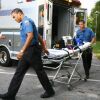A question posted recently on Quora asked, “What are the best coping strategies for stressful jobs?” An anonymous emergency nurse gave her opinion on the topic below. Check it out and add your own thoughts in the comments.
I’m going to start with a true account of a couple of the most traumatic things that I have had to deal with if I may. These are the ones that I can recall in superb detail. I can see the faces of these patients when I close my eyes at night. These are the people who make me question my role and then make me realise that they are WHY I do the job I do.
One late winter night, we received a ‘red phone’ pre-alert in the emergency department. The paramedics were en route with two victims of a road accident. They were a mother and her young child. Her son, I will call him Adam, was in cardiac arrest on arrival. We tried desperately to resuscitate him, the hopelessness of the situation becoming more obvious as the minutes ticked by — the only sound in the resuscitation room was the ticking of the ‘timing’ clock — the seconds remaining of this life starkly audible.
He died. His very short life gone, no fanfare. Just the silent tears of the resuscitation team. And then I spent the next six or seven hours sitting with his mum as we attempted to put her back together.
Our team of experienced, seasoned and hardened professionals was damaged. We needed to do something so that we would be able to come back and, potentially, do the same thing again the following night.
One of the other, memorably traumatic, incidents was the traumatic cardiac arrest of a young girl who had been beaten by a former partner while her child was in the room. Again, hers was a life tragically cut short.
The ways in which ‘I’ cope are probably the same as the ways in which many other people cope. I rely on the team of which I am part. I talk to the people in the team, share experiences, cry with them when I need to — in many ways, these people are no longer mere ‘colleagues’, they are more my family than my relatives.
We in the emergency department have a very dark sense of humour. This is not because we are unkind or heartless, it’s because it’s a coping strategy. We laugh at things that ‘normal’ people wouldn’t understand. We giggle uncontrollably at the merest little thing. We use ‘in-jokes’ to cement our bonds.
Most of us have some form of hobby — often at the extreme ends of the scale. I mountain bike, miles and miles in the toughest terrain and the most inclement weather. On the days when I feel that I am about to ‘go under’ my bike keeps me sane and calm and able to face another day. Colleagues variously run, horse ride, shoot, fly and hang glide.
We party together, wild and funny nights when there is too much alcohol and we are united by a common bond which is the knowledge of the fragility of human life.
Some people will argue that there is a personality type that is better suited to this kind of work. That may well be true but I strongly believe that. with the right support, most people could do it.
When I started my emergency career, I was vulnerable and nervous. I would cry easily and think that I would never ‘get it’. But support from colleagues and a recognition of the need for ‘coping’ strategies have made this my life.
And it’s a good life.












